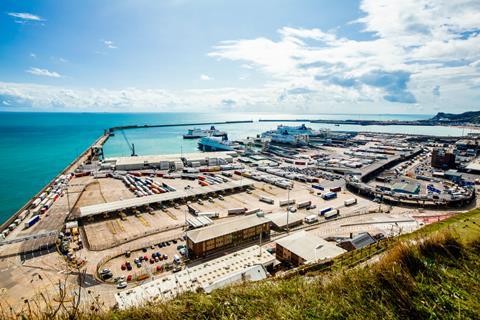Urgent clarification is still required from the government about how the new border checks will work and the cost implications for SMEs when they come into force on 30 April, according to food transport hauliers.
With just over a week to go before the new border target operating model (BTOM) goes live, Logistics UK said its members did not share the government’s confidence that everything would run smoothly.
The government said it had “full confidence” that the infrastructure and systems were in place for health and safety checks on EU imports of certain food goods to commence at the end of the month.
In a blog post, the department for environment, food and rural affairs (Defra) said: “The priority for physical checks from day one will be on the highest risk goods, and port health authorities will be conducting documentary checks on consignments of all risk levels and will contact traders where they have concerns.
“Checks will be scaled up to full check levels in a sensible and controlled way.
“Our approach ensures we are striking the appropriate balance between protecting the UK from biosecurity risks and facilitating trade.”
However, Nichola Mallon, head of trade and devolved policy at Logistics UK, said: “As well as serious concerns about the cumulative cost of all these new processes on SMEs in particular, fundamental questions remain about the capabilities of the government’s facilities to process loads containing food and other perishable goods efficiently and at pace.
“Any delays can ruin fresh produce, making it worthless and this could cause breaks in the UK’s interconnected supply chain.
“Further urgent clarification is needed from government on the exact timeline as to when physical checks will be scaled up and whether the common user charge will also be applied in a phased approach.”
Mallon said that despite haulage companies’ best efforts to prepare for the BTOM, its members continued to face chaos: “Logistics businesses deserve clarity on how they are to continue to operate effectively to protect the UK’s supply chain,” she added.
The Cold Chain Federation (CCF) said it welcomed Defra’s engagement with the group and its recognition that a pragmatic approach was required.
“Food logistics businesses are trying to make final preparations for operating under the new system from 30 April, not only the changes that will be required to processes but also preparing for the additional costs, planning for mitigating anticipated disruption, and responding to the decisions of some EU-based customers to change or stop their exports to the UK,” added CCF chief executive Phil Pluck.
“The ongoing confusion about how and when new checks will be introduced makes these preparations incredibly challenging, but it is not too late for government to work with industry to improve the transition.
“A phased approach is the right one but businesses urgently need clear information about what exactly these phases will include, and a definitive timeline.”
A government spokesperson said: “There has been extensive engagement with businesses over the past year – with our approach welcomed by several trade associations and port authorities. We will continue to work with and support businesses throughout this process to maintain the smooth flow of imported goods.
“We are confident we have sufficient capacity and capability across all points of entry to handle the volume and type of expected checks. It is important to remember the cost of our border checks is negligible compared to the impact of a major disease outbreak on our economy and farmers.”















